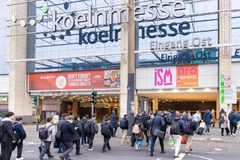DS Smith replaces one billion plastic pieces with fiber across global FMCG industry
30 May 2024 --- DS Smith has replaced more than one billion pieces of plastic in partnership with major FMCG brands. Plastic items that have been replaced include fruit and vegetable punnets, plastic carriers and shrink-wrap on soft drink bottles.
“It is important to note that if our customers — the biggest FMCG brands — are to remove plastics at scale and pace, they need the right regulatory framework around them. What we need are stronger, harmonized, global regulations that level the playing field to help businesses move away from plastic,” says Miles Roberts, group chief executive at DS Smith.
DS Smith has replaced over 1.2 billion pieces of plastics across its international markets, surpassing its self-set target 16 months ahead of schedule.

European plastic replacement demand
The company’s target was primary or secondary plastic packaging, which has now been reduced or removed from customers’ packaging as a result of DS Smith’s solution.
The achievement has its roots in a plastic replacement and reduction program established in 2020 as part of DS Smith’s Now & Next Sustainability Strategy.
 The Smith Round Wrap solution for bottles. The target extends across DS Smith’s operations in 27 countries across Europe and North America, working toward designing out waste and keeping materials in the loop.
The Smith Round Wrap solution for bottles. The target extends across DS Smith’s operations in 27 countries across Europe and North America, working toward designing out waste and keeping materials in the loop.
The packaging giant says that certain markets stand out, having reduced or avoided plastic through fiber-based alternatives. The UK leads the way, having replaced over 274 million pieces of plastic. France follows, replacing more than 260 million pieces and Germany is in third place after replacing over 153 million pieces.
Demand for plastic replacement continues to grow, says DS Smith. Throughout Eastern Europe, the company has almost doubled the annual amount of plastic pieces replaced since the target was set in 2020.
Circular packaging design
DS Smith highlights that critical to meeting the one billion target and a fundamental part of the design process, are itsCircular Design Principles and Circular Design Metrics (CDM) which were created in partnership with the Ellen MacArthur Foundation.
DS Smith’s 800 designers have been trained in Circular Design Principles and can assess performance against recycled content and recyclability, indicative estimated CO2 emissions, levels of excess waste and supply chain parameters in partnership with customers.
DS Smith has implemented its “industry first” CDM across various sectors, including retail goods, F&B, automotive parts and industrial devices.
“When we set our Now and Next sustainability strategy, we wanted to include goals that delivered environmental change beyond as well as within DS Smith. By innovating to help our customers replace or reduce plastics, we are responding to societal demands to reduce plastic pollution and growing our partnerships with customers,” says Roberts.
By Natalie Schwertheim












